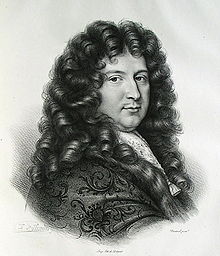Né François Le Tellier. Successor to his father, Michel Le Tellier, as principal military and strategic adviser to Louis XIV. He was the main transformer of the French Army into an instrument of royal authority and foreign policy. In part, he accomplished this by helping his father and Louis establish the Régiment du Roi in 1663 as a model for all French infantry regiments. He also founded the Royal-Artillerie in 1673 as a professional and concentrated artillery arm. These reforms had influence on military developments far beyond France.
Following a pattern set by his father, with whom he understudied from 1662 to 1670, Louvois lobbied hard for bullying wars as the main basis of French foreign policy. He did so not least as a means of creating opportunities to concentrate more power and wealth in his own hands. He was centrally involved in reorganization of the French Army away from private regiments and mercenaries to a more professional officer corps and to regular units raised from the king’s subjects. He exercised such strict control over officers, however, that tactical and operational mediocrity was often the result. In logistics he found a calling, notably fully developing the magazine system left in rudimentary form by his father. Among Louvois’ more important innovations was to introduce portable ovens to bake bread during halt days while a French army was on the move. At the onset of the Dutch War (1672-1678), Louvois accumulated in forward magazines enough grain to provide the advancing armies with 200,000 rations per day for up to six months-an unheard of achievement in European warfare since the fall of Rome. This effort is widely regarded by historians as his finest. It ensured Louis XIV early military success that would not be replicated in later, longer wars fought without Louvois at his side. For this material accomplishment, regardless of Louvois’ many and deep moral flaws, he is properly regarded by historians as the first great civilian “minister of war.”
In 1663 Louvois set out to curtail military corruption mainly by centralizing military administration. He also introduced stricter disciplines against common soldiers. He announced an official policy of flogging for any discovered passe volant, and the infamous lieutenant-colonel Jean Martinet set about enforcing it. Two years later, Louvois added branding as a punishment for taking the king’s coin without bearing the king’s arms beyond the parade ground. When war broke out, the problem of missing rankers not only continued, but deepened. As late as 1676, Louvois ordered the traditional punishment of having one’s nose cut off for this crime against the royal purse. The practice of passe volant continued mainly because it was lucrative for captains and colonels, who also did not take the risk of disfigurement. Louvois therefore ordered execution of passe volants and established a rewards scale for any French soldier denouncing a corrupt captain or other officer. The offending officer was not to be flogged, but was fined and might even lose his commission. This set of draconian orders attacking both ends of the problem finally discouraged most military impersonators.
As for his moral failings, they were many and great. For instance, during Turenne’s march through the Palatinate in 1674, Louvois demanded that the harshest methods be used against German villagers who resisted by any means, or who refused to pay contributions. During the War of the Reunions (1683-1684), he again displayed a penchant for personal cruelty and brutality in punishing villagers. He once ordered fully 20 villages be bombarded and burned in retaliation for the loss of two French barns. Although he was patron to Vauban, the two disagreed about whether to use bombardment as an alternative to siege warfare. John A. Lynn, the leading modern historian of the French Army, maintains that Louvois took a savage approach to war and that, for him, bombardment of towns with mortars during the 1680s “became something of a blood lust.” Nor did his none-too-gentle master in Versailles voice any objection. In 1688 Louvois began to raise new provincial militia to supplement the regular regiments. These were gainfully employed when Louis started the Nine Years’ War (1688-1697) that fall. Louvois planned the 1688-1689 devastation of the Palatinate (1688-1689) on a map, reveling yet again in the destruction of German towns and cities, and even individual chateaux. His death on July 16, 1691, removed from inner policy circles a baleful and brutish influence on Louis XIV, a monarch who needed little encouragement to indulge his own vices and a pronounced preference for war over diplomacy.
